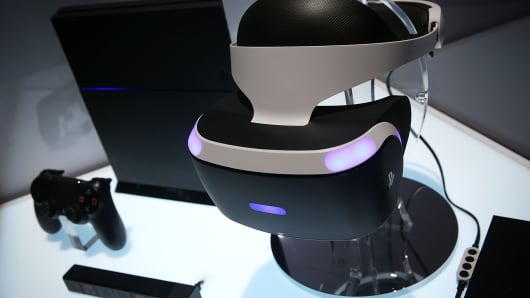Sony’s announcement of the pricing and release date of the PlayStation VR, a virtual reality (VR) gaming system, has set the scene for tough competition among tech giants offering VR products.
A report by market researchers SuperData estimates VR gaming software and devices generating $5.1 billion in revenue in 2016.
This week, Sony Computer Entertainment CEO Andrew House revealed the PlayStation VR will be released in October with a price tag of $399.
In comparison, the Facebook-owned VR system, the Oculus Rift, will cost $599, while the HTC Vive will cost $799.
However, the Vive and Oculus Rift will require expensive, high-end PCs in order to play games, while the PlayStation VR will only require a PS4 gaming console.
This price difference gives Sony a key competitive advantage, according to Piers Harding-Rolls, director and head of games at IHS Technology. Sony has sold around 36 million consoles since the PS4 launched in 2013, giving it a large market of consumers ready to adopt VR.
“When you take into account the total cost of ownership of using a PS4 as a source device, Sony’s experience is around half the price of its PC-based competition,” said Harding-Rolls in a note.
“When Oculus and HTC announced their relative headset pricing, Sony was offered an open goal opportunity to take an early lead in the consumer VR market, which they have taken with aplomb.”
Brand loyalty to Sony, as well as its reputation as video game giant, will also prove to be a boon, according to Andrew Kitson, senior telecommunications analyst at BMI Research.
“Oculus Rift and HTC are relative unknowns outside their core markets and, in any case, run on high-end PCs equipped with the latest version of Windows,” he told CNBC in an email. “Sony’s walled garden strategy will therefore serve it well in appealing to existing PS4 owners, those looking to make the leap to a new console and those looking for a trusted brand.”
The PlayStation’s low price point may help its competitors in the longer term, as it will encourage game developers to create content for the devices.
“Games written for VR devices will be relatively limited in ambition as developers will not want to risk investing heavily in software that may not sell very well,” explained Kitson. “The arrival of low-cost solutions such as the PS4 iteration means that developers can become more confident.”
[“source -cncb”]






